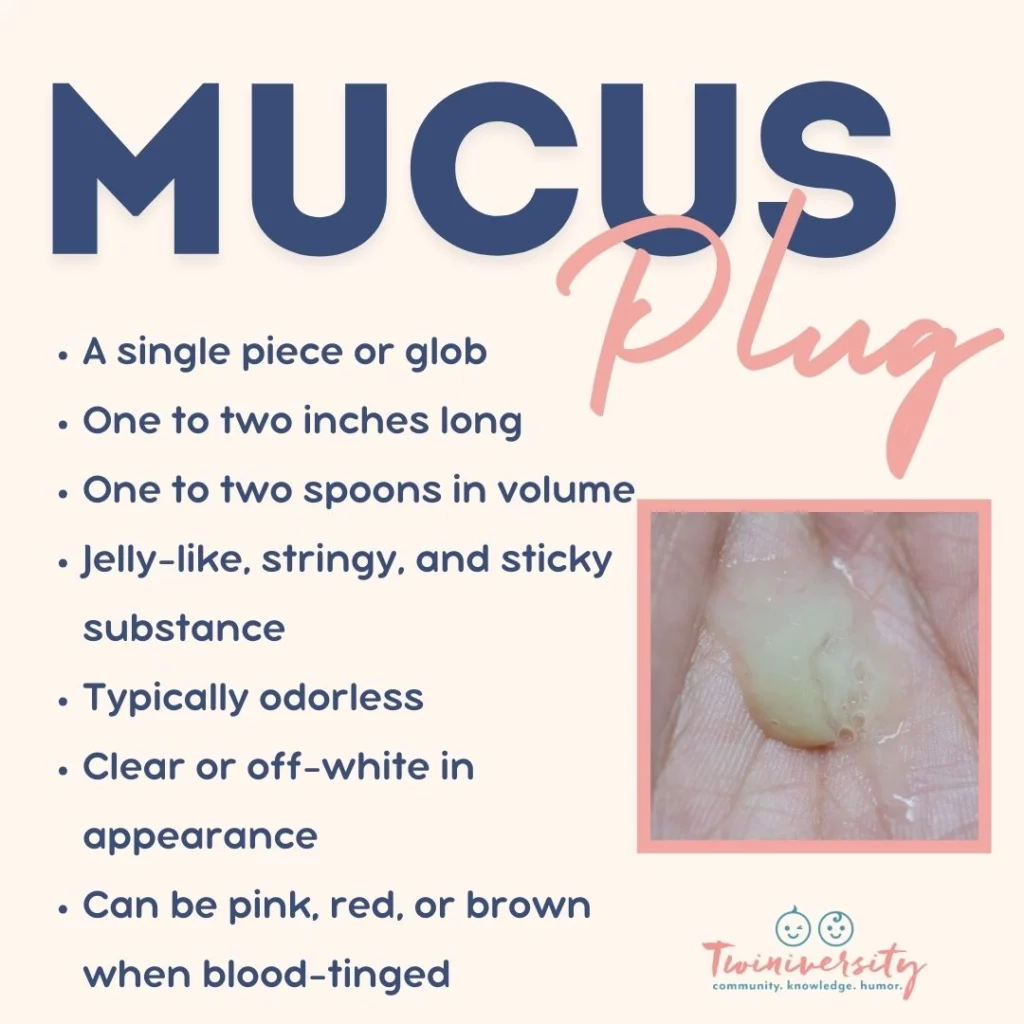
If you haven’t discovered it yet, pregnancy is a journey filled with all sorts of unexpected surprises and quirky bodily functions. Just when you thought you had read up on everything, along comes the mucus plug – an MVP (Mucus Very Protective) player you didn’t know you needed. Here’s everything you need to know about mucus plugs!

What Exactly is a Mucus Plug?
Think of the mucus plug as the front door to your house. It keeps everything secure inside, preventing any unwanted visitors (bacteria and infections) from entering. When the time is right, the door opens to welcome the new little resident into the world. A mucus plug is a thick, gelatinous blob that forms in the cervical canal during pregnancy. It protects your babies by keeping bacteria and other potential intruders out of your uterus.
What Does It Look Like?
So, what happens when your mucus plug decides it’s time to exit the house? It’s not quite a grand exit, but it’s definitely a noticeable one. The mucus plug can look like:
- A thick glob of mucus.
- A jelly-like substance.
- Clear, yellowish, or slightly bloody (a bit of pink or brown tinge is normal).
- Relatively odorless.

Some people describe it as looking like snot (let’s be real, pregnancy is full of delightful bodily fluids). Others might see it as a more solid, gel-like clump. All in all, it resembles the mucus that comes out of your throat when you have a cold instead of the blood you may see during your menstrual period.
Double the Babies, Double the Mucus Plugs?
You might be wondering if you’ll lose two mucus plugs. While it sounds logical, rest assured you’ll only have one mucus plug to lose despite having double the joy on the way. Your body’s security system is just that efficient.

If you just heard that second heartbeat for the first time, or you know it’s been two for a while, you need to read our twin pregnancy week by week timeline to help you learn what happens week by week with twins. Click here to learn more… and while you’re at it, check out our expecting twins classes and twin parent coaching services.
The Big Question: What Does Losing the Mucus Plug Mean?
As your body gears up for labor, your cervix starts to soften, thin, and open. This process causes the mucus plug to dislodge from your cervix and move into your vagina. You might notice it in your underwear or on toilet paper after wiping. This is known as losing your mucus plug. Losing your mucus plug is like a gentle nudge from Mother Nature saying, “Get ready! Things are about to get real.”
Losing your mucus plug can mean:
- Early Sign of Labor: For many, it’s a sign that labor is on the horizon. It could be hours, days, or even weeks away.
- Cervical Changes: Your cervix is getting ready for the main event. It’s thinning and dilating, preparing for your babies’ debut.
Losing your mucus plug doesn’t mean you need to sprint to the hospital immediately, especially if you’re not having contractions. So, no need to speed to the hospital just yet.

You might lose your mucus plug in a single glob, or it may come out gradually over time. You might not even notice it! And if you see blood, don’t panic. It’s normal to see a small amount, but if you experience heavy bleeding, it could indicate placental abruption, placenta previa, or another complication. Be sure to contact your healthcare provider if you notice any significant bleeding during pregnancy.
Twiniversity Tip: If you think you’ve lost your mucus plug, TAKE A PICTURE! This is the most helpful thing you can bring to your provider to help them with your care.
Can my Mucus Plug “Grow Back?”
Yes, the mucus plug can rebuild itself in your cervix. You may lose parts of it and then lose more later on. This happens because your body consistently generates vaginal discharge and mucus during pregnancy.
So, When Should You Be Concerned?
While losing the mucus plug is usually a routine part of the pregnancy process, there are a few instances when it’s worth raising an eyebrow (and calling your healthcare provider):
- Bright Red Blood: If you notice more than a little streak of blood, especially if it’s bright red, give your healthcare provider a ring.
- Heavy Bleeding: Significant bleeding is a red flag and warrants immediate attention.
- Preterm Labor Signs: If you’re before 37 weeks and you start experiencing regular contractions, back pain, or pressure, it’s time to check in with your healthcare provider.

Embrace the Journey
As you navigate the final stretch of your pregnancy, remember that every unusual symptom, including losing your mucus plug, is a step closer to meeting your little ones. It’s a signal that your body is preparing for the incredible task ahead. Embrace these moments, even the sticky ones, as part of the unique story of bringing twins into the world.
Keep calm, carry on, and get ready to meet your twinnies. You’ve got this!
Here’s what other twin moms had to say about losing their mucus plugs:
“I lost my mucus plug at 23 weeks. Called my doctor and he saw me the next morning. Everything looked great. I unexpectedly went into labor around midnight at 30 weeks.. “
“All of my babies were different. The first 2 pregnancies when the mucus plug fell out I was in labor within a few hours my third pregnancy my mucus plug fell out and I ended up being induced a week later.”
“I lost mine on Tuesday afternoon then went in to labor Thursday morning.”
“I started losing pieces of it between 35-36 weeks, ended up having my C-section at 37+1 but didn’t experience much labor other than a few contractions in week 35.”
“I’ve lost a few large globs but normally lose small pieces at least once a week. It’s worth noting that I am slowly dilating and effacing and have been since about 26ish weeks. Doesn’t mean anything major at all.”

“I lost mine over 2 days and went into labor about 5 days later.”
“I went into labor 24 hrs later!”
“I lost some at 22 weeks, now I am 31.”
“I never lost/saw mine for my first pregnancy and was induced but lost mine for this one at 34 weeks and am currently 36+5, am scheduled for induction at 38+1, and was not dilated at all when checked a few days ago. My doctor said it’s nothing to be concerned about, just stay on the lookout for other symptoms of early labor.”
“I had my twins about 12 hours after I lost mine.”
“I lost a huge piece of mine around 30-31 weeks and then at 31 weeks I lost a very small piece of it and my water broke a couple hours later.”
“I started losing pieces of mine at 30w. My MFM put me on Procardia. Then my water broke at 32w but for only one of the twins’ sacs. I was hospitalized for 18 days while they monitored for infection and kept me on meds to prolong labor. Girls came out perfect and had 10 days in the NICU.”
Related Topics
- What Causes Pregnancy Rib Pain and What Can You do About it?
- Dysgeusia: The Little-Known Pregnancy Symptom
- Choosing Your Medical Team for Twin Pregnancy
- Doctor’s Appointments in Twin Pregnancy: What to Expect

Kylee Burleigh lives in Washington State and effortlessly juggles multiple roles while embracing the chaos of a vibrant family life. With a Bachelor’s degree in communications, she’s a wizard at weaving compelling stories. When she’s not busy wrangling words, Kylee is a dedicated wife with fraternal twin girls, adding a delightful twist to her already bustling life. She tackles a full-time communications job, provides stellar marketing services to clients and is a contributing writer to Twiniversity. In her rare moments of respite, Kylee embraces holistic living and immerses herself in thrilling outdoor escapades like hiking, hunting and tearing through the wilderness in her trusty side-by-side.










